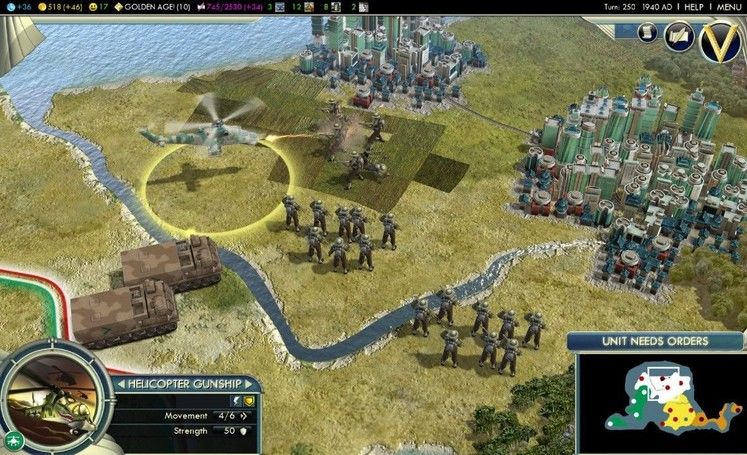 |
| Remember guys, no stacking |
Having merely observed the game at E3, we were finally able to get our hands on a playable version and, twenty eyes and little sleep later, we're ready to give a more practical analysis. The first thing that struck me, random though it is, is that Leonard Nemoy is no longer the narrator. Instead, we are left with the gravely yet soothing tones of William Morgan Sheppard, of Star Trek and Babylon 5. Not the most important aspect of the game, admittedly, but considering that the voice of the narrator is heard every time you research a new tech (and now with every faction's intro sequence as well), it's hard not to notice.
Any severe changes to the game would run the risk of either being immensely unpopular, or changing the game beyond a point where you could still call it a 'Civ' game, but what does that leave? Again - God is in the details, and whether it's the new Hex grid, the elimination of road spaghetti, or the abolishing of religion (ish), it all adds up to provide a new paradigm.
The thing that I personally found most frustrating about Civ IV was the combat - as a bit of a wargamer used to Total War or Age of Empires, or the Blizzard games of old, combat in a strategy game is key. If you didn't have good combat mechanics then you'd run the risk of getting bored. To us, Civilization always had a problem with providing engaging combat - Civilization IV's stack-static tactics of just throwing waves of units against your enemy abstracted combat to a silly degree, and even made taking cities a right pain. No More.
The first step in improving combat has been to prevent stacking. Now any single grid can only be occupied by one combat unit, and combat units overall take longer to make and cost a lot more to maintain. This both decreases the size of armies and opens up realistic combat fronts - and even forces you to think tactically. Ranged units can now actually fire at range (really though, it took them five games to figure this out?), allowing you to create a 'second rank' to make up for the fact that combat space is a premium.
 |
| Seriously though, five games? |
Cities now have health, instead of just being garrisoned by however many units you can pile in. This makes them easier to deal with, although also easier to underestimate. The health is tied to things like size, the presence of walls, castles etc... and you can garrison one unit in there to provide an extra boost. Cities can also now fire back at enemies, independently of whatever unit is acting as the garrison. Tied into this is the change from a square to a hexagonal grid. This grants new and easier tactical manoeuvring, but is also used in regards to city growth as well - now cities expand in accordance to their needs, not in an automatic outward bound circle of influence.
This isn't really new information though, but then again none of it is - Firaxis have kept little back with regards to what's new and what's changed in Civilization V. The only thing you won't know is how it feels when playing the game, how it feels to play on a hex grid, or how it feels to deal with City-States which, instead of being just another AI you have to deal with, truly do add a whole new dynamic to the game. Do you befriend and defend them, or do you conquer them outright? I once thought about simply taking over two city-states I had been buddies with for a while, but then I realised that would make me feel bad.
Religion and Espionage have been pretty much removed from the game, as have things like corporations and a lot of the 'meta' games. In fact you could go as far to say that there's been a noticeable decrease in micromanagement and meta-features. Makes you wonder whether these things were a 'failed' experiment or not in Civ IV, and some may even resent the back-tracking in terms of depth. Technology is left unchanged, and say what you will, but I think I will always resent being more or less forced to progress my civilisation through the ages - although the timing seems to have been improved. In Civ IV there were instances where I had hit a new era before having fully gotten to grips with the current one.
 |
| The new engine makes everything look very slick and natural |
If you were to sum up Civilization V in a word (or two) it would be 'more natural'. The new game engine gives it more natural looking graphics, the improved AI means that civilizations act in a more natural manner, even combat is more 'natural'. Civilization V is the culmination of nearly twenty years worth of work, and this is probably going to be the best game of the series yet - but don't expect a breath-takingly new experience. It's the same Civilization you know and love, just evolved once again. If God is in the details, then this is as close to Heaven as we're going to get. Civilization V is due out on PC and Mac (eventually) on September 21st in the US, and September 24th in the UK.
Most Anticipated Feature: It's hard to pin down one particular feature, but the improved combat mechanics over all have made this a much more enjoyable game.




